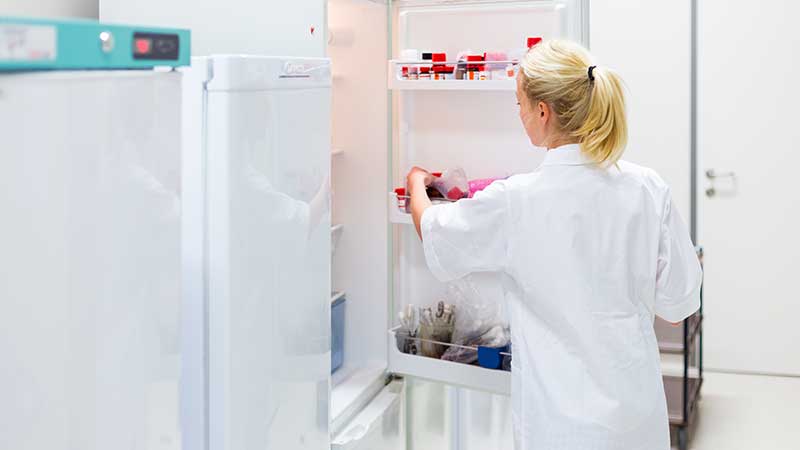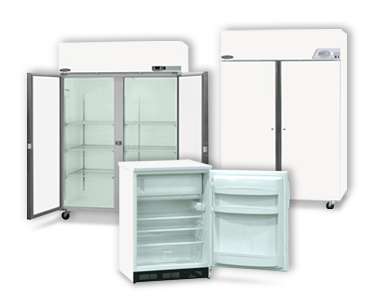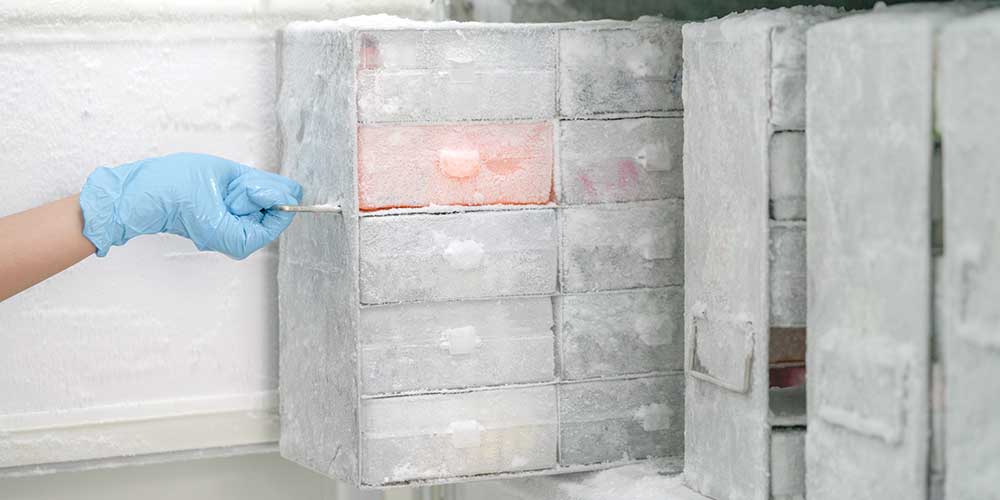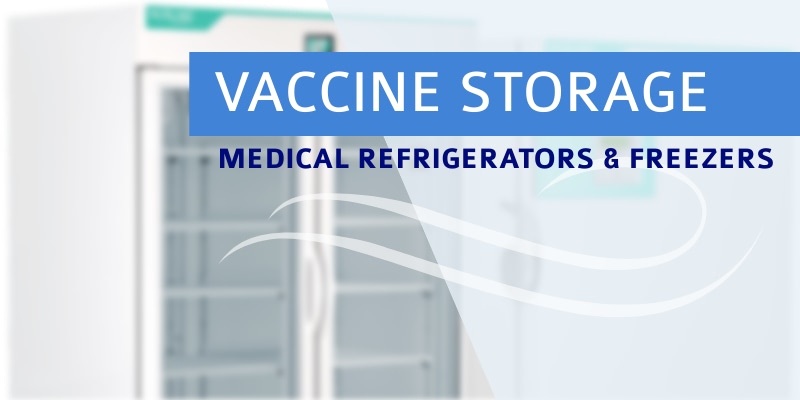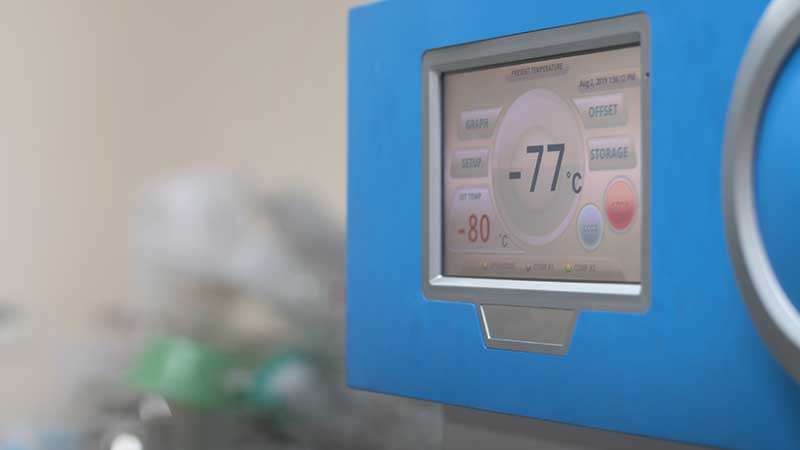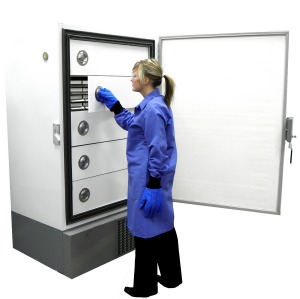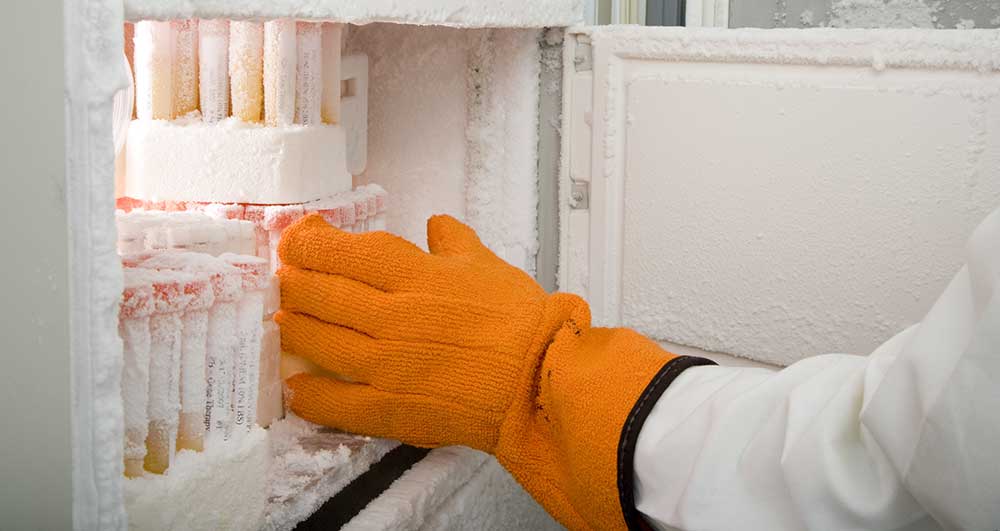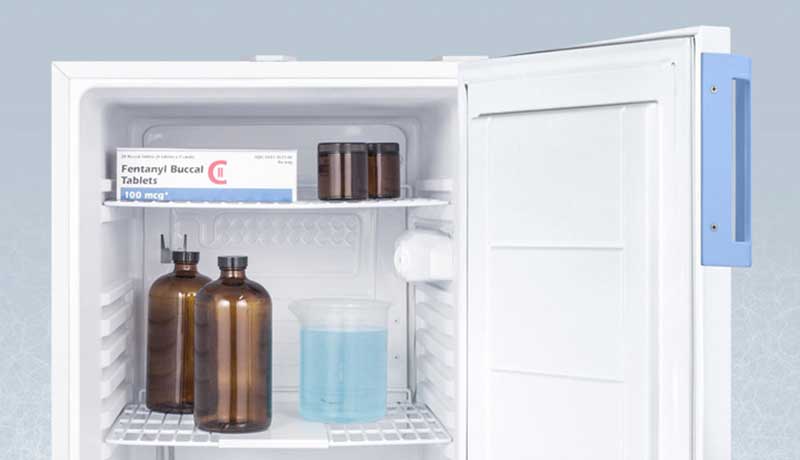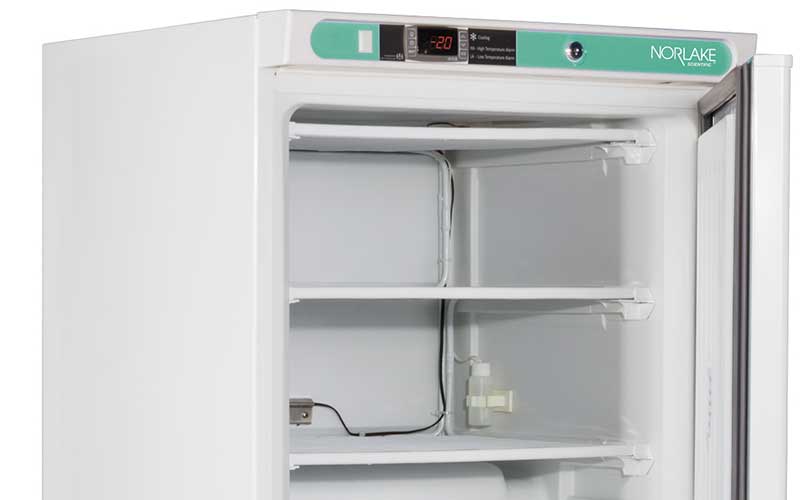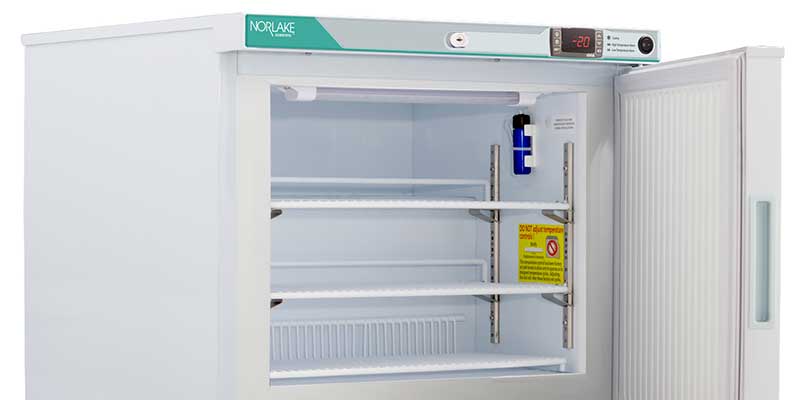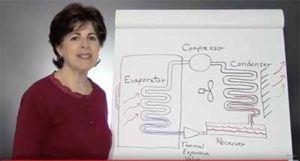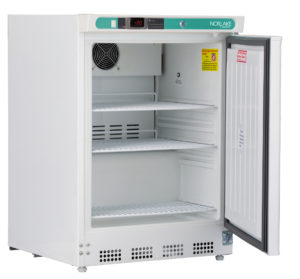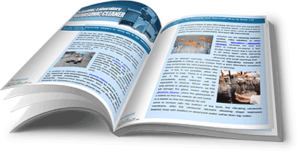Lab Freezer
Laboratory Refrigerator Selection Criteria
A laboratory refrigerator or freezer plays a critical role in healthcare facilities, universities, pharmaceutical and medical device manufacturing, and law enforcement. Vaccines, pharmaceuticals, blood samples, plasma, biological specimens and other temperature-sensitive products should not be stored in residential and commercial units.
Proper storage of temperature-sensitive products is governed by organizations such as the Food and Drug Administration and the Centers for Disease Control and Prevention. Pharmaceutical and medical device manufacturers provide recommended storage temperatures for their products.
Why Laboratory Refrigerator Systems are Critical
- Improper storage of vaccines results in loss of potency and the expense of re-vaccination.
- Storing valuable or irreplaceable biological specimens is another example where proper temperature control is critical.
- Replacement costs and potential penalties due to improper storage justify investments in scientific laboratory refrigerators and freezers.
This post covers criteria to consider when specifying your laboratory refrigeration equipment.
Lab Refrigerator and Freezer Categories
Let’s start with … Read the rest
How to Specify a Super Cold Freezer
Across a range of biological and medical research as well as industrial applications there are many areas where what can be termed a super cold freezer is required. Examples include long-term storage of pharmaceuticals and biological specimens, and for testing a product’s ability to perform in super-cold environments such as to -85˚C.
Selecting an ultra-low freezer involves carefully considering the nature of your requirements including the quantity and types of products being stored, required storage temperatures, and frequency of access.
So with this, let’s take a look at how specify a super cold freezer.
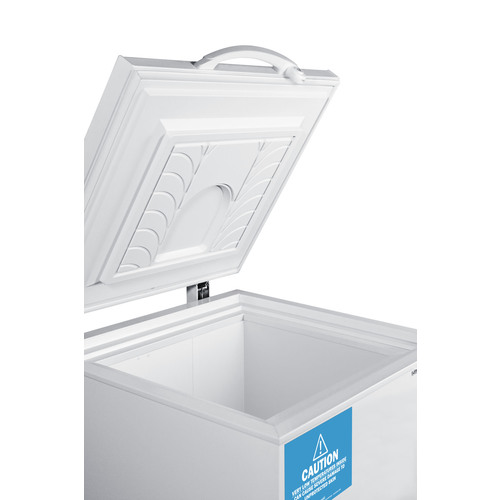
What is Meant by Ultra-Low Freezers?
As you know from your visits to the appliance section of home improvement stores, there are many types of freezers on the market. These are not candidates for your application.
Different terms apply when specifying scientific (not commercial or household) freezers. Manufacturers such as Corepoint Scientific, accucold and So-Low … Read the rest
Specification Guidelines for Medical Refrigerators
Medical refrigerators – also called laboratory and scientific refrigerators – employed across healthcare and research facilities can be broadly classified into three categories:
- Medical refrigerators – operating at temperatures between 35⁰ and 46⁰F (2⁰ and 8⁰C)
- Medical freezers – operating at a temperature range of -4⁰ to -31⁰F (-20⁰ to -35⁰C)
- Ultra low temperature freezers with a temperature range of -58⁰ to -123⁰F (-50⁰ to -86⁰C)
Temperatures shown are examples. Temperature capability is indicated on manufacturers’ spec sheets. What’s important for you is selecting a medical refrigerator system that conforms to guidelines established by government and professional associations.
Note that household or commercial-grade units are not recommended for medical refrigeration as they are unable, for example, to maintain temperatures to exacting standards.
Costs of Improper Storage
As one example, improper storage, malfunctioning equipment, human error, and power failures annually cause thousands of dollars in losses due to compromised vaccines. … Read the rest
When and How to Specify an Ultra-Low Freezer
At this posting Phase 3 clinical trials are underway for COVID-19 vaccines, some of which call for an ultra-low freezer for storage and transport. Examples described in a September Wall Street Journal article notes the unusually cold storage temperatures – as low as -80⁰C – required. Covid-19 vaccine candidates are one of many applications for ultra-low freezers. This post provides you with info on when and how to specify one of these units.
Unlike “ordinary” freezers, ultra-low freezers are not inexpensive. The investment is important when the job is to protect contents of high value and sometimes for long periods of time. More on this below.
Fortunately there are a number of ultra-low freezers on the market to ease the selection of a model that best suits your needs.
What is Meant by Ultra-Low Freezers?
Good question.
There are freezers, low-temperature freezers … Read the rest
Low-Temperature and Ultra-Low Temperature Freezers for Covid-19 Vaccines
A question posed in the September 5-6, 2020, Wall Street Journal asks “do we have enough freezers?” This relates to the unusually cold storage temperatures – as low as -80⁰C – recommended by certain producers of Covid-19 vaccine candidates in Phase 3 clinical trials.
Proper vaccine storage temperatures have always been a concern as evidenced by the CDC’s continually updating its Vaccine Storage and Handling Toolkit. The Toolkit details stringent recommendations relating to critical considerations such as staffing and training for safe handling, storage and temperature monitoring, inventory management, transport, and emergency vaccine and storage handling.
Earlier, MarketWatch identified Moderna, BioNTech and Pfizer as examples of Covid-19 candidates requiring low temperatures (-20⁰C Moderna) and -70⁰C (BioNTech and Pfizer). Other candidates are J&J Janssen and AstraZenca at between 0⁰ and -10⁰C. In total, some 9 firms have advanced to Phase 3 trials as reported in a Wall Street Journal September … Read the rest
How to Specify a Compact Medical Refrigerator
Health care clinics must exercise care when selecting a compact medical refrigerator to store temperature-sensitive products such as vaccines and other pharmaceuticals. A compact medical refrigerator is a smart choice when space is at a premium, but a small size should not be at the cost of critical features that protect contents. This post provides tips on how to specify a compact medical refrigerator.
Why a Medical Refrigerator is Important
If there is temptation to buy a dormitory or residential-grade refrigerator it must be resisted. In fact, the former is definitely ruled against in the CDC’s Vaccine Storage and Handling Toolkit while the latter may be acceptable under certain conditions. We encourage you to download and review these guidelines, updated for 2020 before you decide on your medical refrigerator.
Especially important is compliance with CDC and Vaccines for Children refrigeration guidelines if your healthcare facility participates in these programs.
The “Cost”
… Read the restHow to Select an Under Counter Lab Freezer
If space is at a premium for safely storing temperature-sensitive pharmaceuticals, lab samples or costly biological specimens, an under counter lab freezer may be the answer. Laboratory freezers are more sophisticated than residential or commercial units. They have features essential to protect contents from temperature excursions. This post provides researchers with useful information to help with their selection process.
What to consider when selecting under counter lab freezers
First, let’s put the dollar sign in perspective. These units will cost more than residential or commercial units. You (and your accounting department) must compare the cost of the lab freezer to the value of its contents.Proper storage temperatures for many pharmaceuticals, specimens and biological samples are defined. Temperature excursions above or below these may result in losses that in some cases may be irreplaceable.The cost of loss due to freezer malfunction is described in the article Cost of Research Lab Freezer … Read the rest
How Scientific Refrigeration Equipment Works
Scientific refrigerators, also called pharmaceutical refrigerators or lab refrigerators, meet stringent requirements essential to protect contents from temperature fluctuations above or below those recommended by content manufacturers. Residential-type refrigerators do not make the grade. Reasons described in this post will help you understand how scientific refrigerators work.
- How scientific refrigerators “make cold”
- The difference between manual and auto defrost scientific refrigerators
- Tips on proper use of your scientific refrigerator
- Ongoing care and maintenance of scientific and pharmaceutical refrigerators
- Tips on moving your scientific refrigerator
How Scientific Refrigeration Equipment Makes Cold
The first thing you need know is that when a liquid evaporates it absorbs heat and when a gas condenses to a liquid it releases heat. Got that? Good.
Let’s start with the receiver where the liquid refrigerant is stored under high pressure. The liquid passes through a thermal expansion valve causing a … Read the rest
Norlake White Diamond Feature-Rich Line of Undercounter/Freestanding Refrigerators and Freezers
To select the correct undercounter/freestanding lab refrigeration system from the Norlake White Diamond series for a small to medium-sized laboratory or healthcare facility you must evaluate a system’s capability to satisfy a number of important criteria. This post explains important criteria to consider. They include:
- required storage capacity
- refrigerator/freezer temperature range
- stable, accurate temperature control
- alarm systems signaling temperature excursions
- auto defrost vs. manual defrost
- compliance with standards
- other useful features
While these criteria apply to any laboratory/scientific refrigeration system, our post focuses on undercounter/freestanding refrigerators and freezers for small to medium-sized facilities. Our examples come from the new line of Norlake White Diamond units now available from Tovatech.
Determine Optimum Storage Capacity
Lab and scientific refrigerators and freezers, as with domestic models used in your home, are available in a wide range of storage capacities. Two things to keep in mind about storage capacity when selecting your unit:… Read the rest
Manual or Auto-Defrost Cold Storage Units for Lab
Lab refrigerators and lab freezers come in various sizes and temperature capabilities, many of which are designed for specific storage functions. What you store in these units has a large part in determining the type of unit you purchase. This post will cover decision-making factors such as storage temperature capability and whether manual or auto-defrost equipment should be specified when you choose manual or auto-defrost cold storage units for the lab.
We’ll separately take a look at scientific refrigerators and scientific freezers, then provide suggestions on how to manage defrosting operations.
Always keep in mind that temperature monitoring and alarming is a subject onto itself in laboratory refrigerators and freezers. The defrosting operation by definition signals a change in storage temperature within these units, whether a scientific freezer or scientific refrigerator. We’ll touch on this briefly at the end of our post.
In addition, two important points to include in … Read the rest
